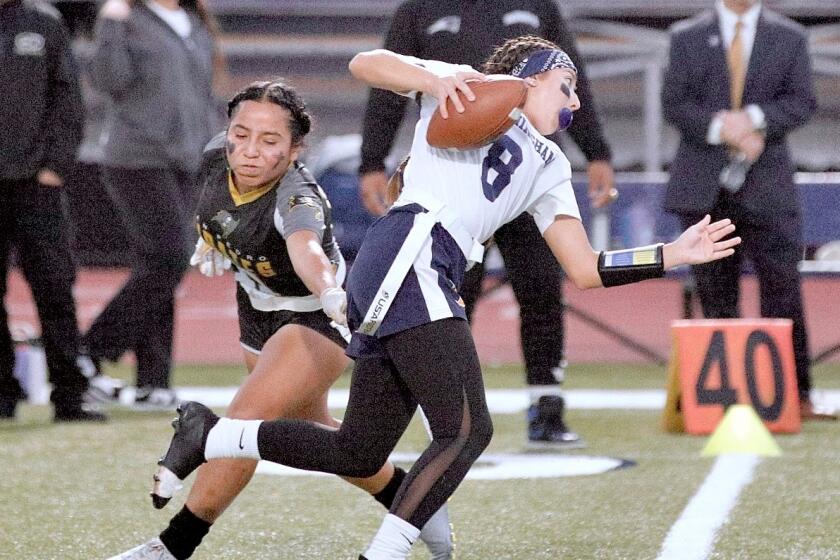Column: There’s no reason to change the playoffs format because the Yankees might be at a ‘disadvantage’
Take a seat before you read this.
Please. We wouldn’t want you to get hurt because you fell down laughing.
Here goes: Major League Baseball is proceeding with a playoff system that is just not fair to the New York Yankees. Yes, ladies and gentlemen, boys and girls, and fans of all ages: The system is holding the Yankees down.
This is the seventh year of the current postseason format, but the potential Yank-apocalypse has spawned a wave of East Coast commentary about how the system must be changed. The Yankees could win 100 games, so the argument goes, but their terrific season could come down to one game: the sudden-death, wild-card game. How about some RE2PECT for the Yankees?
Oh, it’s not about the Yankees? We did not hear all these insistent cries for reform three years ago, when the Pittsburgh Pirates won 98 games, and their postseason experience was one and done.
The Yankees might not finish with the second-best record in the major leagues this year. The Pirates did, three years ago, and they accepted their fate with grace.
If there were second-place teams winning 95 games every year, perhaps MLB would need to reconsider the playoff format. But in the previous five years, how many times did an American League wild-card team win more games than one of the AL division champion teams?
Not one.
“I don’t think you should get into redesigning your system based on the outcome in a particular year,” Commissioner Rob Manfred said at the All-Star Game last month.
With the Boston Red Sox running away with the AL East, the Yankees could play the Red Sox in the division series — if the Yankees qualify for the one-game wild-card playoff, and win. The combatants in television’s favorite rivalry could share an October stage, or the Yankees could be one and done.
“Nobody appreciates the Yankee-Red Sox rivalry more than I do in terms of how important it is for the game,” Manfred said. “But I would also suggest to you that if it was — oh, pick two teams — the Brewers and Reds that might be winning 100 games, that the uproar would probably be a little less than the Yankee-Red Sox one.”
A quick review: In 1993, the San Francisco Giants won 103 games, second in the major leagues to the Atlanta Braves. But the Braves and Giants played in the National League West, so the Braves went to the playoffs and the Giants went home.
In 1994, MLB divided each league into three divisions, instead of two, then added a wild card in each league. The wild card, the second-place team with the most victories, advanced directly to the division series.
There was no significant penalty for holding a wild-card ticket to the postseason dance. In 2002, two wild-card teams — the Angels and Giants — met in the World Series. That year was the first of six consecutive years in which the World Series included at least one wild-card team.
So, in 2012, MLB added a second wild-card team in each league, then pitted the wild cards against each other in a play-in game. That put two notable hurdles before each wild-card team: lose, and your October is done in a day; win, and you probably have burned your best pitcher before you could use him in Game 1 of the division series.
Ron Gardenhire, the manager of the Detroit Tigers, believes that a season of 162 games should not end in a postseason of one game, where a better team could lose to a team with a hotter pitcher, and where the fans of two playoff teams do not get to see at least one playoff game at home.
Every round of the playoffs should be at least five games, he said, even a wild-card round that could leave the division champions idling for more than a week.
“Put two more teams in,” Gardenhire said. “Let them all [expletive] play. Do it like tennis. Have [expletive] brackets and they’ve all got to work their way down.”
Mike Scioscia, the manager of the Angels, believes the current system does not sufficiently disadvantage the wild-card teams. The team that wins the wild-card game, he said, should get the first game of the division series at home.
“Then go play four on the road,” Scioscia said. “If you get through that, more power to you. You’ve earned your way into the league championship series.”
Scioscia was one of 14 members of a committee that recommended the current playoff format to then-commissioner Bud Selig. In a telephone interview from his Milwaukee office, Selig acknowledged that television networks influenced the decision for the wild-card teams to play one game rather than a best-of-three series.
“It was a part of the equation,” Selig said, “but not the critical part. In many things in sports, you’re down to one game. You don’t play best two out of three.”
With no momentum to expand the wild-card round beyond one game, reform advocates have proposed playoff seeding. The five postseason qualifiers in each league would be ranked by how many games they won.
If the Yankees won the second-most games of any team in the AL, and if the Cleveland Indians won the AL Central with the fewest wins of any of the league’s playoff entrants, the Yankees would not be dispatched to that one-game playoff. The Indians would be.
That is a solution in search of a problem. The second wild-card team in each league was added because MLB owners and executives believed too many teams had advanced to the World Series without winning their division. This isn’t the NBA or NHL, where half the teams make the playoffs.
Unless MLB wants to do away with divisions completely — and that was the system before 1969 — then winning your division should help you, not hurt you, come playoff time.
Scioscia had no sympathy for the argument that the Yankees could be at a disadvantage by the system.
“Then win your division,” he said. “You might win 100 games, but you didn’t reach your goal of winning your division. This gives the team that wins the division a much better position.”
The Yankees opened play Saturday nine games behind the Red Sox. Here’s why: New York’s record against the other three teams in the AL East — the Baltimore Orioles, Tampa Bay Rays and Toronto Blue Jays — is 21-16. Boston’s record against those teams: 32-10.
Selig said he had endured far more criticism about the introduction of the wild card — and the blasphemy of including a second-place team in the playoffs — than about the system now in place.
“Have I had any second thoughts? No,” he said, “because it put a premium on winning your division. The one constructive criticism of the earlier system had been that it did not give enough credence to winning your division.”
To the extent that the system puts the Yankees at a competitive disadvantage — wait, what? When the Yankees, and the Dodgers, and other wealthy teams share all of their revenue with their competitors, then we can take up the issue of competitive disadvantage.
Until then, we offer a one-word response to the cry that the system is unfair to the Yankees.
Poppycock.
Follow Bill Shaikin on Twitter @BillShaikin
More to Read
Go beyond the scoreboard
Get the latest on L.A.'s teams in the daily Sports Report newsletter.
You may occasionally receive promotional content from the Los Angeles Times.











